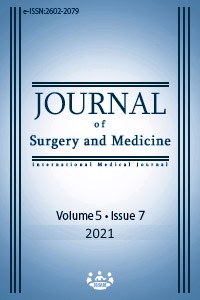Investigation of ultrasonic chronic total occlusion system on a rabbit model
Keywords:
Peripheral artery, Ultrasonic chronic total occlusion system, Animal model, Endothelial injuryAbstract
Background/Aim: Advanced treatment options are needed in chronic total occlusion (CTO), which is a special subgroup of peripheral artery disease. Endothelial damage remains a problem in the endovascular treatment of peripheral artery CTO. In our study, this subgroup was examined with an ultrasonic total occlusion system for vascular endothelial damage on an animal model. Methods: We used twenty-four rabbits divided equally into three groups, created chronic total occlusion in the common iliac artery by applying a bioabsorbable polymer sponge, and waited four weeks for CTO formation. After four weeks, the samples obtained from the groups were examined histologically. Results: Significantly less endothelial damage was detected in the ultrasonic total occlusion system group compared to the directional atherectomy group (P<0.05). Conclusion: Ultrasonic atherectomy minimizes thrombus load and causes minimal endothelial damage. These findings show that the ultrasonic atherectomy method can be successfully used in CTO treatment.
Downloads
References
Pigott JP, Raja ML, Davis T. A multicenter experience evaluating chronic total occlusion crossing with the Wildcat catheter (the CONNECT study). Journal of vascular surgery. 2012;56(6):1615-21.
Gallagher KA, Meltzer AJ, Ravin RA, Graham A, Shrikhande G, Connolly PH, et al. Endovascular management as first therapy for chronic total occlusion of the lower extremity arteries: comparison of balloon angioplasty, stenting, and directional atherectomy. Journal of Endovascular Therapy. 2011;18(5):624-37.
Suzuki Y, Oyane A, Ikeno F, Lyons JK, Yeung AC. Development of animal model for calcified chronic total occlusion. Catheterization and Cardiovascular Interventions. 2009;74(3):468-75.
Grover SP, Evans CE, Patel AS, Modarai B, Saha P, Smith A. Assessment of venous thrombosis in animal models. Arteriosclerosis, thrombosis, and vascular biology. 2016;36(2):245-52.
George S, Cockburn J, Clayton TC, Ludman P, Cotton J, Spratt J, et al. Long-term follow-up of elective chronic total coronary occlusion angioplasty: analysis from the UK Central Cardiac Audit Database. Journal of the American College of Cardiology. 2014;64(3):235-43.
Hamur H, Onk OA, Vuruskan E, Duman H, Bakirci EM, Kucuksu Z, et al. Determinants of chronic total occlusion in patients with peripheral arterial occlusive disease. Angiology. 2017;68(2):151-8.
Jones DA, Weerackody R, Rathod K, Behar J, Gallagher S, Knight CJ, et al. Successful recanalization of chronic total occlusions is associated with improved long-term survival. JACC: Cardiovascular Interventions. 2012;5(4):380-8.
Shetty R, Vivek G, Thakkar A, Prasad R, Pai U, Nayak K. Safety and efficacy of the frontrunner XP catheter for recanalization of chronic total occlusion of the femoropopliteal arteries. Journal of Invasive Cardiology, 2013;25(7):344-7.
Babic S, Sagic D, Radak D, Antonic Z, Otasevic P, Kovacevic V, et al. Initial and long-term results of endovascular therapy for chronic total occlusion of the subclavian artery. Cardiovascular and interventional radiology. 2012;35(2):255-62.
Kirvaitis RJ, Parr L, Kelly LM, Reese A, Kamineni R, Heuser RR, et al. Recanalization of chronic total peripheral arterial occlusions using optical coherent reflectometry with guided radiofrequency energy: a single center experience. Catheterization and Cardiovascular Interventions. 2007;69(4):532-40.
Saket RR, Razavi MK, Padidar A, Kee ST, Sze DY, Dake MD. Novel intravascular ultrasound-guided method to create transintimal arterial communications: initial experience in peripheral occlusive disease and aortic dissection. Journal of Endovascular Therapy. 2004;11(3):274-80.
Casserly IP, Sachar R, Bajzer C, Yadav JS. Utility of IVUS‐guided transaccess catheter in the treatment of long chronic total occlusion of the superficial femoral artery. Catheterization and cardiovascular interventions. 2004;62(2):237-43.
Fusaro M, Dalla Paola L, Biondi-Zoccai G. Pedal-plantar loop technique for a challenging below-the-knee chronic total occlusion: a novel approach to percutaneous revascularization in critical lower limb ischemia. Journal of Invasive Cardiology. 2007;19(2):E34-7.
Mossop P, Cincotta M, Whitbourn R. First case reports of controlled blunt microdissection for percutaneous transluminal angioplasty of chronic total occlusions in peripheral arteries. Catheterization and Cardiovascular Interventions. 2003;59(2):255-8.
Staniloae CS, Mody KP, Yadav SS. Endoluminal treatment of peripheral chronic total occlusions using the Crosser® recanalization catheter. Journal of Invasive Cardiology. 2011;23(9):359.
Fusaro M, Agostoni P, Biondi‐Zoccai G. “Trans‐collateral” angioplasty for a challenging chronic total occlusion of the tibial vessels: A novel approach to percutaneous revascularization in critical lower limb ischemia. Catheterization and Cardiovascular Interventions. 2008;71(2):268-72.
Banerjee S, Thomas R, Sarode K, Mohammad A, Sethi S, Baig MS, et al. Crossing of infrainguinal peripheral arterial chronic total occlusion with a blunt microdissection catheter. Journal of Invasive Cardiology. 2014;26(8):363-9.
Aslam MS, Allaqaband S, Haddadian B, Mori N, Bajwa T, Mewissen M. Subintimal angioplasty with a true reentry device for treatment of chronic total occlusion of the arteries of the lower extremity. Catheterization and Cardiovascular Interventions. 2013;82(5):701-6.
Gandini, R, Volpi T, Pipitone V, Simonetti G. Intraluminal recanalization of long infrainguinal chronic total occlusions using the Crosser system. Journal of Endovascular Therapy. 2009;16(1):23-7.
Downloads
- 425 565
Published
Issue
Section
How to Cite
License
Copyright (c) 2021 Ferit Kasimzade, Fatih Ada, Özhan Karataş
This work is licensed under a Creative Commons Attribution-NonCommercial-NoDerivatives 4.0 International License.
















